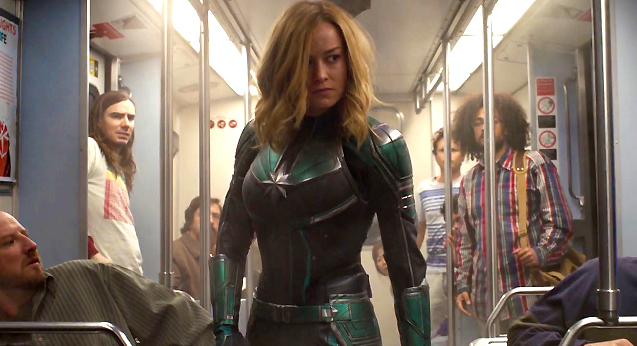The MCU finally gets a headlining female superhero in the uneven but worthy Captain Marvel

The Marvel Cinematic Universe finally gets a headlining female superhero as Brie Larson plays a super soldier with a mysterious past alongside Samuel L. Jackson, Jude Law and Ben Mendelsohn. It’s uneven but worthy, writes critic Craig Mathieson.
Captain Marvel begins briskly, omitting a villainous prologue and a genial introduction, in presenting the unsettled Vers (Brie Larson), a gifted rookie in the Starforce, an intergalactic military unit in the service of the Kree, an advanced alien race. A rebel without applause, Vers has fractured memories starting with trauma and no history, a situation that requires a sparring session and stern advice from her commanding officer and mentor, Yon-Rogg (Jude Law). Marvel’s belated introduction of a lead female superhero works to keep you entertained and yet off balance – co-directors’ Anna Boden and Ryan Fleck’s film is a surreptitious dismantling of the genre they’re successors to, sometimes awkward but ultimately uplifting.
Vers’ murky past includes time on Earth, a situation revisited when she plunges from the sky above California one day in 1995 after an unsettling encounter with the Kree’s shape-shifting enemy, the Skrulls, and their leader Talos (Ben Mendelsohn and his Australian accent). Firing photon blasts from her hands is enough to convince U.S. government agent Nick Fury (a digitally de-aged Samuel L. Jackson) of her bona fides, and the manipulative spymaster of previous Marvel movies is a jaunty sidekick here, offering banter amidst the cultural gags of video stores and dial-up internet connections. This is the most Gen-X friendly movie the studio has ever produced.
A year ago with Black Panther, director Ryan Coogler and his collaborators were able to offer an alternate Afrocentric history of strength and resilience. Captain Marvel doesn’t have that exterior strength, instead working to distinguish itself through interior self-realisation. Too many Marvel films have been about the responsibility of greatness and carrying a mantle, but Vers – or Carol Danvers as she previously was on Earth – doesn’t know who she is, only who she’s been told she can be. Amidst the sleuthing by mismatched pair of Vers and Fury, complete with grunge gags and tasty musical cues, there’s a thorough dismissal of authority figures and allegiance to the state while refugees are protected from a “shameful war.” Make what you will of Annette Bening’s sly take on Hillary Clinton.
Boden and Fleck made their bones with independent dramas, notably 2006’s compelling Half Nelson and most recently 2015’s Mississippi Grind (co-headlined by Mendelsohn). They have a feel for the friction of characters who can’t find contentment in their world, and the self-destruction that can eventuate. That continues here, with Vers rediscovering her life as Carol, and the intensity of her friendship with a fellow former pilot, Maria Rambeau (Lashana Lynch). The scenes between them, particularly where Maria recounts what she lost when Carol disappeared, have a genuine empathy and connection, with Brie Larson more at ease than she is as initially cocky woman who fell to Earth.
Unfortunately they can’t find a similar finesse visually, with rote chase scenes and hand-to-hand combat that lacks a distinct sense of spatial feel or an illustrative dynamic. In Wonder Woman Patty Jenkins kept the frame open, so that the commanding strength of Gal Gadot’s Diana shone through, but Carol has to fight her out of a box, much as she has to battle to piece together who she is. What makes the film work is that a woman claiming her identity from a life that’s told her otherwise is explicitly feminist, and when Captain Marvel asserts herself it’s not just with noble intent but also galvanising pleasure. Nevertheless, you realise, she persisted.

















